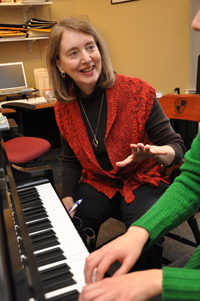
Phil Farnsworth
Stephany Tiernan
For media inquiries, please contact Media Relations
Stephany Tiernan is a composer, pianist, author, teacher, educational leader, and Steinway Artist. She has been active in the presentation of new music since the ‘70s and is chair emerita of the Piano Department and a professor at Berklee College of Music. She has been teaching composition, analysis, and piano for over 40 years and has influenced many of the successful composers and pianists of today. The author of a book and video on contemporary piano technique called Contemporary Technique: Coordinating Breath, Movement, and Sound (Berklee Press/Hal Leonard), Tiernan developed this technique as a continuation of the groundbreaking work of Madame Margaret Chaloff. This approach to piano technique has been used by thousands of pianists worldwide.
Tiernan has performed much of the world’s greatest contemporary piano music in many of its prestigious halls. Performances have included music by Charles Ives, John Cage, Henry Cowell, and many others. She has performed and recorded much of her own piano music, and her works are often inspired by her interest in and studies of Irish culture and language. Tiernan has used visual imagery, poetry, ancient sean-nós singing, Celtic symbols, festivals, and holy places for her inspiration, creating pieces that connect her to her Irish roots. Her piano compositions, including a piano quintet, are featured on her CD Hauntings: Scream of Consciousness. Dedicated to the art of improvisation, her collaborations with internationally acclaimed jazz pianist JoAnne Brackeen resulted in their widely acclaimed piano duet recording, Which Is Which, which eliminates the boundaries between classical and jazz piano playing.
- Pianist, and accompanist for numerous instrumental, dance, and vocal performances
- Composer and performer of 20th-century piano music
- Private lessons with Margaret Chaloff
- Steinway Artist, performing much of the world’s greatest contemporary piano music including music by Charles Ives, John Cage, and Henry Cowell
- Composer, performing and recording much of her own piano music, often inspired by her interest in and studies of Irish culture and language
- Presenting new music since the ‘70s involving both interpretation and improvisation in contemporary piano music, with strong jazz influences
- Author of book/video on contemporary piano technique, Coordinating Breath, Movement, and Sound (Berklee Press/Hal Leonard)
- Featured piano compositions on her album, Hauntings: Scream of Consciousness, and her improvisation collaboration with JoAnne Brackeen, Which Is Which, which eliminates the boundaries between classical and jazz piano playing
- Chair Emeritus, Berklee College of Music
- Steinway Artist
-
School NameThe New England Conservatory of MusicState or ProvinceMassachusettsDegreeMaster of Music (M.M.)Field of StudyCompositionDate Degree Received
-
School NameBerklee College of MusicState or ProvinceMassachusettsDegreeBachelor of Music (B.M.)Field of StudyCompositionDate Degree Received
